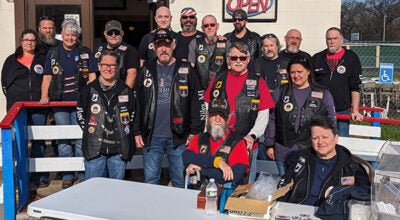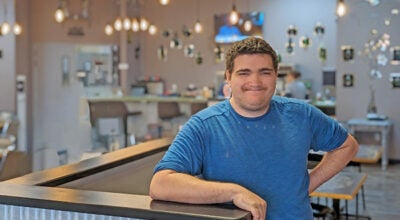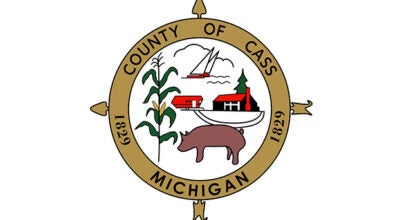Creating Kitty Litter didn’t satisfy restless Edward Lowe
Published 9:31 am Thursday, November 5, 2009

Heidi Connor Nov. 4 in the “Small Town, Big World” section of the SMC museum which chronicles Kitty Litter clay king Ed Lowe and others whose contributions transcend Cass County. (The Daily News/John Eby)
By JOHN EBY
Dowagiac Daily News
A “consummate entrepreneur,” the billion-dollar cat box filler restless Edward Lowe created with Kitty Litter was but the tip of an iceberg of business opportunities his fertile mind seized at a feverish pace.
Edward Lowe Foundation historical collection manager Heidi Connor gave a glimpse into lesser-known ventures Wednesday night at The Museum at Southwestern Michigan College, such as August 1971’s Frenchy Bucksaw pre-packaged firewood, Lowe-Boy Trailers available in seven models in 1967 or hats which played music.
Firewood, test-marketed in Kalamazoo, Cassopolis, St. Joseph and Elkhart, Ind., developed a distinct drawback when bugs sealed inside started scampering out into stores.
Connor, who divides her time between Michigan and Florida, sorts Lowe’s accomplishments into three “tiers” – marketing clay in a bag he called Kitty Litter and developing a new industry; vertically integrating the clay business for self-sufficiency that did not outsource; and investing $17 million to identify material to make cat box filler with after clay supplies were depleted.
“He was green before it was popular, for which I commend him,” Connor said.
“His costs were low and his profits were high,” she said of his strategy of “wheeling and dealing in real estate” while constantly reinvesting to grow his business.
“He wanted to know everything there was, from stem to stern, top to bottom,” with an unquenchable appetite for knowledge and learning.
She is going on 15 years with Lowe and knew the man himself for a few months before the Cassopolis tycoon died Oct. 4, 1995.
He is buried at his beloved Big Rock Valley Farm in Penn Township, where he could “hear the corn grow.”
“Ed was always thinking about what he could do next, what opportunity would present itself,” Connor said. “He was truly driven.”
Her audience included Lowe’s widow, Darlene, and her son, Lowe Foundation President Dan Wyant, the state agriculture director from 1996-2005 who is now an SMC trustee.
Lowe’s penchant for writing poetry and short stories came from his mother. “They corresponded by letters quite a bit,” Connor said.
He “never wanted to lose a thought,” which with all that was usually tumbling around inside his head meant lots of jotting.
“I can still pull open drawers and find notes from Ed,” Mrs. Lowe said.
Connor said Lowe was especially generous when it came to his hometown, which he served as a two-term village president and as a county planner.
“For him, all roads led to Cassopolis,” she said.
“That was one of his favorite sayings,” although it was Jones he tried to resurrect in the 1970s.
“He designed a birdhouse, he designed a storage grain facility. He was a thinker,” Connor said. “Entrepreneurs find opportunity in change. They think about the world external to them or their business is changing and look for opportunities in this change. They analyze things and make accommodations for these opportunities. They’re strategic thinkers who are able to react quickly. They’re willing to try new things and stop when they don’t work out. They will abandon an idea and move on. They know to start small and build. They gravitate to big ideas and long-term thinking. They process information quickly. Edward Lowe was the consummate entrepreneur.”
Henry Edward Lowe Jr., who published his life story, “The Man Who Discovered the Golden Cat – the Tom Sawyer of our day who made $100 million dollars by bringing the cat in from the cold,” in 1987.
In it, he recalls going to Bonine’s Elk Park Farms for free movies.
He was born July 10, 1920, in St. Paul, Minn.
Lowe himself believed entrepreneurs were born with an ability he likened to “Beagleism,” in which dogs instinctively chase rabbits.
When the family moved to his mom’s hometown, Marcellus, Ed’s dad wanted to open a grocery store, but four were already operating, so he loaded a truck with provisions he peddled to surrounding farms until the Depression destroyed his trade. He subsequently opened a bakery, a shoe store and an ice cream parlor.
Lowe Sr. and his wife, Lulu Wave Huber, next moved to Vandalia and opened a saloon with Prohibition ended. He also started an ice and coal delivery service.
The son, who graduated from Cassopolis High School in 1939, was always hustling, making deliveries, packing ice cream and gathering herbs.
A maverick, he was outside the mainstream in high school and not a very good student.
He equated studying to following someone else rather than blazing his own trail.
After Japan attacked Pearl Harbor, Lowe joined the Navy and served stateside as a mechanic, early on exhibiting entrepreneurial tendencies.
He developed underwater gear in which he could walk to and fro on the floor of a body of water, spearing fish. His commanding officer nipped the venture in the bud, but he later deployed the system to recover golf balls from pond bottoms.
Enlisted men were required to wear their names and serial numbers on their uniforms.
Lowe procured rubber stamps and ink pads, running a “bedside bunk store,” where he charged $2.50 on his 50-cent investment.
By the time those superiors pulled the plug, Lowe had made $5,000.
Inspired by that initial business success, he looked forward to finishing his service to apply his ideas on a wider scale.
Out of the military, in 1946 Ed joined forces with his father in an expanded business selling sawdust and Dri-Spot absorbent clay to customers that included Whirlpool, Studebaker, Clark Equipment and Bendix.
Before clay-based Kitty Litter offered Kay Draper a cleaner alternative in 1947 and spawned a billion-dollar industry, ashes or sand filled litter boxes.
Lowe advertised Kitty Litter in Life magazine, the Saturday Evening Post and Ladies Home Journal.
Print was preferred to the limited television audience in 9 percent of American homes.
Stores tried to design show windows that reinforced newspaper and magazine spots.
Ed went a step further, setting up incentive competitions, with 1,000 pounds of free Kitty Litter for whatever was judged the best storefront.
Lowe carted Kitty Litter to cat shows, such as a big one in South Bend, Ind.
“This was a turning point for Ed,” Connor said. “He was on his own, he had a product that was working” better than Chicken Litter and he “reorganized to take advantage. To sell his product, he focused his energies on distributors who sold directly to small pet stores. You didn’t go to the grocery store to buy pet products at that time. You either went to a farm supply, a gardening shop or pet stores to buy litter.”
Lowe introduced additional products in flurries, including shampoo, laxatives, flea powder, litter trays and food supplements. Next came novelty cat toys, such as a mouse with a bell and stuffed with catnip.
In 1954, Lowe’s Inc. moved into offices at York and O’Keefe streets in Cassopolis. It handled all the pet items as well as Kitty Litter.
There had been no trade associations previously, but Ed joined each one as it formed and actively engaged in what years later would come to be known as networking. He was president of one such pet industry group in 1957-1958.
“He was energetic and eager to find out what was happening and to be in the forefront,” Connor commented.
Products continued to flow, such as Tidy Cat. Test-marketed in Indianapolis, to be sold in grocery stores, while Kitty Litter remained a “boutique” brand.
Graveletts, introduced in 1957, was a clay-based product similar to Kitty Litter, but coarser, designed to be put in grills to sop up grease and minimize fire danger.
By this time, Lowe owned clay plants in Tennessee and Illinois, shipping semi loads and boxcars across the nation. Eventually, his empire would consist of eight facilities. Scratching posts joined catnip on the product roster.
Next came Petpak, a Milwaukee, Wis., company Lowe acquired in 1963, moved to Cassopolis in 1965 and owned four years until 1967. It made birdseed bells.
In 1964, Lowe constructed a 35-acre industrial park off M-60 in the county seat.
Typical of his showmanship and detail was a letter he sent inviting people to an opening. He fastened a real strip of crimson rug from the figurative red carpet he was rolling out to each piece of correspondence.
August 1966 brought Mr. Friendly Pet Store, which was designed to be a franchise. The first retail store opened at the McKinley shopping center in South Bend. It sold an entire line of animal products – dogs, hamsters and birds as well as felines. He expanded clay absorbent products to include Oil Zorb.
Petpak marked another turning point for Lowe, who focused his energies on clay.
On June 30, 1964, Lowe purchased 160 acres and called it Big Rock Valley Farm. He had a 250-head of Angus cattle and added another 850 acres during the 1970s. He produced a grand champion bull at the Angus show in Kansas City, Mo.
The farm afforded a location for him to delve into research and development for still more clay products, such as Gro-Below and Deco-Mulch. Gro-Below conditioned soil. The latter was decorative mulch.
Lowe toyed with using clay to carry pesticide and insecticide. He dabbled in private label litters such as Kitty Korner, Blue Banner and Sophisti-cat for stores such as Kroger and A&P.
He ultimately decided he was competing with his own products, Kitty Litter and Tidy Cat, and limited such projects to 15 percent of his volume.
Lowe in 1970 co-founded the Sorptive Minerals Institute, a non-profit, national trade association for the burgeoning billion-dollar industry.
Besides marketing, it established quality and safety controls for products and processes used for manufacturing and distributing them.
Lowe’s February 1973 drive through Jones, where he had once delivered ice for his dad, stirred nostalgic yearnings for the good ol’ days before it became a ghost town.
That March, he formed Jones is Back and began buying real estate to realize a tourist attraction created by turning the town into theme park spanning the gay 1890s to Bonnie and Clyde.
An amusement park, an opera house, a petting zoo, a museum, railroad cars and an array of novelty stores.
The community’s reaction was mixed.
Some appreciated the economic boost and jobs.
Others wanted their peace and quiet restored.
They got their wish in 1977 when Jones is Back was auctioned. In April 1979, Lowe opened Executive Auction Services Inc.
The black horse program came about in 1980. He built a stable to breed completely black quarterhorses. That project lasted until the 1990s.
When Kitty Litter succeeded beyond his wildest dreams, Lowe marched on, intent on his “next big thing.”
The late ’70s and early ’80s ushered in such ventures as Weatherpoint Systems, to track violent storms; Azalea Gardens, vacation rentals on the Gulf of Mexico in Florida; Timberline Enterprises, which held all the real estate unrelated to the clay industry and Big Rock Valley; The Edward Lowe Group, or TELG, which explored marketing soybeans to Third World countries as a cheap source of protein; a make-up company; water purification systems; even musical entertainment promotion.
Not that he was through with pet products.
Perfect Menu rolled out in Orlando in 1989.
Lowe was also “green” before there was a name for it.
Grantech and granulation technology were an attempt to pioneer a new post-clay process for producing cat litter. It created pellets from paper mill sludge. The pilot plant was based in Green Bay, Wis. This was in 1992. The green hat he wore in a photo was emblematic of his quality and safety control program.
“Ed would show up with his clipboard and go completely through the establishment,” Connor said, “checking with the plant manager to make sure everything was safe and working well. He really took a lot of pride in looking out for his employees.”
Lowe sold his Kitty Litter empire in June 1990 to Golden Cat Corp.
In May 1991, Lowe bought Vasser Glass, which made decorative tiles.
A public information center at the Lowe Foundation on Decatur Road is open from 9 a.m. to 4 p.m., Monday-Friday.






